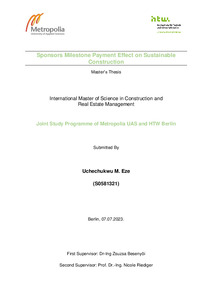Sponsors Milestone Payment Effect on Sustainable Construction
Eze, Uchechukwu Mitchell (2023)
Eze, Uchechukwu Mitchell
2023
All rights reserved. This publication is copyrighted. You may download, display and print it for Your own personal use. Commercial use is prohibited.
Julkaisun pysyvä osoite on
https://urn.fi/URN:NBN:fi:amk-2023091925982
https://urn.fi/URN:NBN:fi:amk-2023091925982
Tiivistelmä
This research work was embarked on owing to the prevalence of project delay and drop in project quality being experienced in the Nigerian construction environment. Sponsors’ milestone payment percentages are not being investigated at present as a probable cause for these issues and this prompted the need for this research work.
With regards to the aforementioned, literatures were consulted to have a better understanding of the topic and discover milestone percentages used in different countries of the world (Nigeria, Germany and UK) while also understanding what sustainable construction is about. Two case studies and questionnaire surveys were used for analysis and validation of the different milestones arrived at. Three variants of milestone percentages were applied to the case studies. One variant was what was agreed between the sponsor and the contractor applied directly to the case study project being assessed. The second variant was application of the variant being used in Germany which is similar to the UK. And finally, the most frequently used percentage obtained from the questionnaire survey conducted. The Survey data was used to validate the results originally obtained from the case studies.
Analysis of the data reveal that indeed milestone payment percentages have effect on project construction time and quality. For suitable construction milestone percentages for projects, at least 50% must be paid to the contractor for the first two major milestones. This is explained further in the body of the research. This gives contractors adequate funding to address challenges on site and ultimately aid in completing construction in required time with other factors remaining favourable.
With regards to the aforementioned, literatures were consulted to have a better understanding of the topic and discover milestone percentages used in different countries of the world (Nigeria, Germany and UK) while also understanding what sustainable construction is about. Two case studies and questionnaire surveys were used for analysis and validation of the different milestones arrived at. Three variants of milestone percentages were applied to the case studies. One variant was what was agreed between the sponsor and the contractor applied directly to the case study project being assessed. The second variant was application of the variant being used in Germany which is similar to the UK. And finally, the most frequently used percentage obtained from the questionnaire survey conducted. The Survey data was used to validate the results originally obtained from the case studies.
Analysis of the data reveal that indeed milestone payment percentages have effect on project construction time and quality. For suitable construction milestone percentages for projects, at least 50% must be paid to the contractor for the first two major milestones. This is explained further in the body of the research. This gives contractors adequate funding to address challenges on site and ultimately aid in completing construction in required time with other factors remaining favourable.
